Brazzaville’s Melodic Envoys
The Republic of Congo has long relied on musical ambassadors to project an image of vibrancy that transcends political headlines. Few carry that mantle with the poise of Fanie Fayar, whose forthcoming appearance from 25 to 27 July at the Karibu Africa Festival in France offers Brazzaville an opportunity to reaffirm its cultural credentials on a European stage. Government officials familiar with the itinerary view her set as part of a broader diplomatic effort to promote national heritage through the arts, a strategy encouraged by the Ministry of Culture and the Congolese embassy in Paris.
The Strategic Stage of Karibu Africa
Since its inception, Karibu Africa has fashioned itself as a laboratory of pan-African creativity, inviting both established and emerging talents to exchange repertoires and industry insights. The 2024 edition, hosted in Lyon, is expected to draw delegates from at least a dozen countries, according to the organising committee. French cultural officials highlight the festival’s capacity to catalyse intercultural dialogue at a moment when global creative industries are navigating post-pandemic realignments. By foregrounding live workshops, professional roundtables and cross-border collaborations, the gathering aligns with the African Union’s Agenda 2063 emphasis on the creative economy as an engine of sustainable development.
Fanie Fayar’s Artistic Trajectory
Fayar’s résumé is emblematic of Central Africa’s rich soundscape. She began in a Brazzaville choir in 1990, refined her craft with the ensemble Yela-We at the dawn of the millennium, and soon graced Abidjan’s MASA marketplace, a rite of passage for francophone performers. Mastery of the tam-tam, ndara and balafon has allowed her to fuse Congolese folklore with funk-soul and Afro-American inflections, earning distinctions such as the 2007 Tam-Tam d’Or and a coveted gold medal at the Abidjan Francophonie Games a decade later. Her Facebook reflection—“There are silences that heal, pauses that mend the soul… ready to share the sacred fire that animates us”—captures both the introspection of her recent hiatus and the resolve that now propels her return.
Cultural Diplomacy and National Image
Observers of Central African affairs note that Brazzaville has progressively woven culture into its foreign-policy toolkit. A 2023 UNESCO report on creative industries places Congo among the states leveraging heritage to foster inclusive growth. By facilitating Fayar’s presence in Lyon, Congolese authorities complement recent initiatives such as the Biennale de la Culture de la Paix and partnerships with the International Organisation of La Francophonie. Diplomatic sources stress that showcasing a female artist of Fayar’s calibre reinforces messages of gender inclusion, a priority echoed by the African Development Bank’s Creative Africa Nexus programme.
Moreover, participation in high-visibility festivals nurtures economic spin-offs: touring opportunities, licensing deals and diaspora engagement. The World Bank estimates that Africa’s cultural sector could generate US$20 billion annually by 2030, provided that intellectual-property frameworks and distribution channels are strengthened. Fayar’s tour, backed by Congolese cultural entrepreneurs, therefore doubles as a case study in creative-industry value chains.
Anticipated Resonance in Lyon
Programming notes suggest that Fayar will share the stage with Algerian jazz fusion, Burundian drum troupes and Ivorian zouglou collectives, a tapestry designed to appeal to both African diasporas and European aficionados. Festival director Jean-Marc Doucouré anticipates “a conversation in rhythm, not merely a concert,” while Congolese diaspora associations in Auvergne-Rhône-Alpes have mobilised to ensure a robust turnout. Local media hint at potential collaborations with French producers, a prospect that could widen distribution channels for Congolese sounds in francophone markets.
A Harmonious Outlook
Should Karibu Africa achieve its projected attendance, Fanie Fayar’s performance may resonate well beyond the confines of Lyon’s riverfront amphitheatre. For Brazzaville, each chord struck is a diplomatic note, bolstering narratives of cultural resilience and regional leadership. For the artist, whose career spans three decades and multiple frontiers, the festival represents both a homecoming and a relaunch pad. As the curtain rises, policymakers and music lovers alike will be listening for echoes of a broader continental renaissance in which Congo-Brazzaville intends to play in tune.

